Ford Kuga VS Mitsubishi Eclipse Cross
In the highly competitive compact SUV segment, the Ford Kuga stands out with its impressive blend of performance and practicality, making it a top choice for families and adventure seekers alike. Meanwhile, the Mitsubishi Eclipse Cross offers a distinctive design and a comfortable ride, catering to those who prioritize style and technology. Ultimately, the decision between these two versatile models will come down to personal preferences in space, features, and driving experience.
Ford Kuga
The Ford Kuga stands out in the realm of compact SUVs with its sleek design and dynamic performance capabilities. Its spacious interior is thoughtfully designed to provide comfort and practicality for both driver and passengers, making it an ideal choice for families and adventurers alike. Advanced technology and safety features further enhance the driving experience, ensuring a seamless blend of innovation and reliability on the road.
detailsMitsubishi Eclipse Cross
The Mitsubishi Eclipse Cross presents a sleek fusion of dynamic design and versatile functionality, perfect for urban adventures and weekend getaways alike. Its elegant lines and bold front grille make a strong statement on the road, while its well-appointed interior offers a comfortable and connected driving experience. With advanced safety features and intuitive technology, the Eclipse Cross ensures drivers feel secure and in control, whether navigating city streets or scenic routes.
detailsIn the competitive landscape of compact SUVs, the Ford Kuga and Mitsubishi Eclipse Cross stand out as intriguing options for drivers prioritizing both style and performance. Below, we delve into a detailed comparison of these two vehicles, focusing on their technical aspects and innovative features.
Design & Dimensions
Starting with the exterior, the Ford Kuga boasts a length ranging from 4604 mm to 4645 mm, offering a more spacious presence compared to the Mitsubishi Eclipse Cross, which measures 4545 mm. The Kuga's width of 1882 mm is also notably broader than the Eclipse Cross's 1805 mm, contributing to its more imposing stance on the road. When it comes to height, both vehicles are relatively close, with the Kuga measuring between 1673 mm and 1681 mm, while the Eclipse Cross stands a bit taller at 1685 mm.
Powertrain Options & Performance
The Kuga offers a range of powertrain options, including petrol, full hybrid, and plug-in hybrid configurations. With power outputs ranging from 150 HP to an impressive 243 HP, drivers can choose between efficient engines and robust performance. The Kuga's acceleration times are impressive as well, with the fastest variant capable of sprinting from 0-100 km/h in just 7.3 seconds. In terms of fuel efficiency, the Kuga provides a commendable consumption rating of up to 5.3 L/100 km.
In contrast, the Mitsubishi Eclipse Cross is solely available as a plug-in hybrid, producing 188 HP. While it may not offer as varied an engine lineup as the Kuga, the Eclipse Cross impresses with a low fuel consumption rate of just 2 L/100 km, highlighting its eco-friendly credentials. Acceleration is where it lags behind, however, clocking in at 10.9 seconds from 0-100 km/h.
Electric Capabilities & Emissions
The Ford Kuga shines with an advanced hybrid offering, boasting an electric range of up to 69 km, while its hybrid variants achieve impressive CO2 emissions ratings. The Kuga emits between 20 g/km and 145 g/km, depending on the model selected, thanks to its efficient engineering.
The Mitsubishi Eclipse Cross, while focusing on plug-in hybrid technology, provides an electric range of 45 km and an efficient emissions output of only 46 g/km. This makes it an attractive option for environmentally conscious drivers, especially for urban environments where electric driving is advantageous.
Interior & Comfort Features
Both vehicles comfortably seat five passengers, but the Kuga edges out slightly with a trunk capacity of 412 L, surpassing the Eclipse Cross's 359 L. Interior design in both models emphasizes modern aesthetics and user-friendly technology, showcasing high-quality materials and ergonomic placement of controls.
Innovations set these two SUVs apart as well. The Kuga is equipped with Ford's latest SYNC 3 infotainment system, incorporating smartphone integration features, voice command capabilities, and advanced navigation systems. The Eclipse Cross, on the other hand, features Mitsubishi's smartphone link display audio, providing essential connectivity for tech-savvy users. While both vehicles offer substantial tech integrations, the Kuga's suite may ultimately feel more comprehensive to the average consumer.
Safety Ratings & Features
Safety is a compelling factor for almost any SUV buyer, and both models come equipped with a suite of advanced safety features. The Kuga includes Ford Co-Pilot360, which offers features such as automatic emergency braking and lane-keeping assist. The Eclipse Cross also provides robust safety features, including adaptive cruise control and multi-around view monitoring.
Conclusion
In the battle of the Ford Kuga versus the Mitsubishi Eclipse Cross, each SUV has its strengths. The Kuga offers greater versatility in engine choices, superior acceleration performance, and a more generous cargo capacity. Meanwhile, the Eclipse Cross is an ideal choice for eco-conscious drivers looking for impressive fuel efficiency and low emissions.
Ultimately, the decision will hinge on personal priorities: whether you lean towards performance and space (Kuga) or efficiency and urban adaptability (Eclipse Cross). Each vehicle presents an appealing package in its own right, tailored to meet a diverse range of consumer needs.
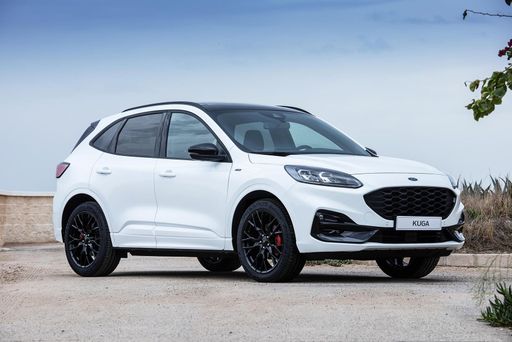 @ kuga.fordpresskits.com
@ kuga.fordpresskits.com
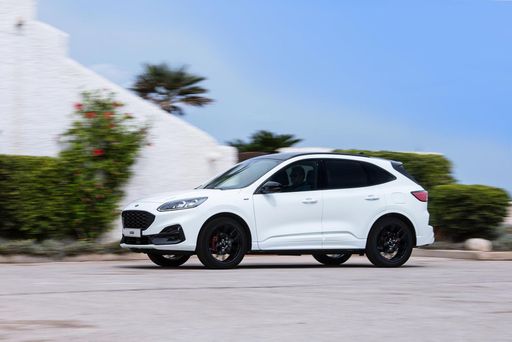 @ kuga.fordpresskits.com
@ kuga.fordpresskits.com
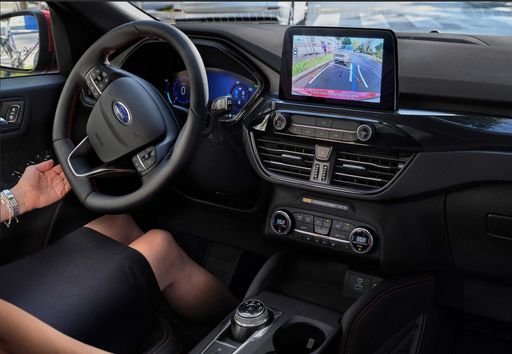 @ kuga.fordpresskits.com
@ kuga.fordpresskits.com
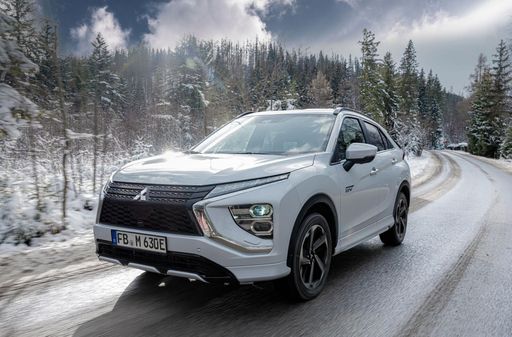 @ Mitsubishi Motos
@ Mitsubishi Motos
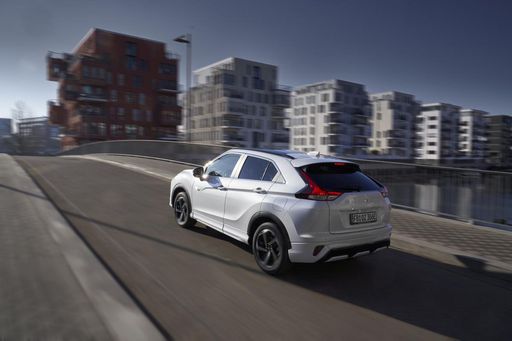 @ Mitsubishi Motos
@ Mitsubishi Motos
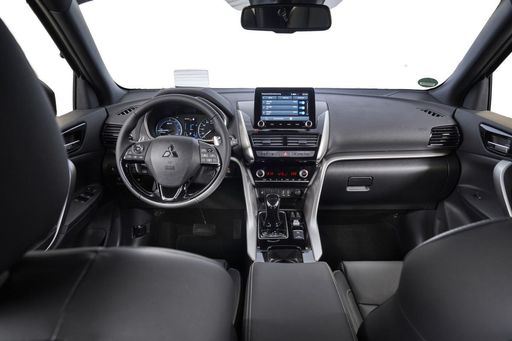 @ Mitsubishi Motos
@ Mitsubishi Motos

|

|
|
|
|
Costs and Consumption |
|
|---|---|
|
Price
about 34200 - 45000
£
|
Price
about 36000 - 42000
£
|
|
Consumption L/100km
0.9 - 6.4
L
|
Consumption L/100km
2
L
|
|
Consumption kWh/100km
-
|
Consumption kWh/100km
-
|
|
Electric Range
69
km
|
Electric Range
45
km
|
|
Battery Capacity
1.1 - 14.4
kWh
|
Battery Capacity
-
|
|
co2
20 - 145
g/km
|
co2
46
g/km
|
|
Fuel tank capacity
42 - 54
L
|
Fuel tank capacity
43
L
|
Dimensions and Body |
|
|
Body Type
SUV
|
Body Type
SUV
|
|
Seats
5
|
Seats
5
|
|
Doors
5
|
Doors
5
|
|
Curb weight
1526 - 1859
kg
|
Curb weight
1985 - 2052
kg
|
|
Trunk capacity
412
L
|
Trunk capacity
359
L
|
|
Length
4604 - 4645
mm
|
Length
4545
mm
|
|
Width
1882
mm
|
Width
1805
mm
|
|
Height
1673 - 1681
mm
|
Height
1685
mm
|
|
Payload
541 - 550
kg
|
Payload
373 - 440
kg
|
Engine and Performance |
|
|
Engine Type
Petrol, Full Hybrid, Plugin Hybrid
|
Engine Type
Plugin Hybrid
|
|
Transmission
Manuel, Automatic
|
Transmission
-
|
|
Transmission Detail
Manual Gearbox, CVT
|
Transmission Detail
-
|
|
Drive Type
Front-Wheel Drive, All-Wheel Drive
|
Drive Type
All-Wheel Drive
|
|
Power HP
150 - 243
HP
|
Power HP
188
HP
|
|
Acceleration 0-100km/h
7.3 - 9.5
s
|
Acceleration 0-100km/h
10.9
s
|
|
Max Speed
195 - 200
km/h
|
Max Speed
162
km/h
|
|
Torque
240
Nm
|
Torque
-
|
|
Number of Cylinders
3 - 4
|
Number of Cylinders
4
|
|
Power kW
110 - 178
kW
|
Power kW
138
kW
|
|
Engine capacity
1497 - 2488
cm3
|
Engine capacity
2360
cm3
|
|
Top speed
195 - 200
km/h
|
Top speed
162
km/h
|
General |
|
|
Model Year
2024
|
Model Year
2021 - 2022
|
|
CO2 Efficiency Class
E, D, B
|
CO2 Efficiency Class
B
|
|
Brand
Ford
|
Brand
Mitsubishi
|
Ford Kuga
Discovering the Ford Kuga: An SUV for the Modern Age
The Ford Kuga has established itself as a versatile and reliable choice in the competitive SUV market. Combining sleek design with innovative technology, the Kuga offers a range of options to suit different driving preferences and needs. Let’s delve into the various technical details and pioneering features that make this vehicle stand out.
Design and Construction
The Ford Kuga embodies a contemporary design ethos, with dimensions that accommodate both functionality and style. Measuring between 4604 and 4645 mm in length, the Kuga is designed to offer ample interior space while maintaining a compact exterior profile. This is complemented by a width of 1882 to 1883 mm and a height ranging from 1650 to 1681 mm, ensuring a comfortable and commanding drive on the road.
Innovative Powertrains
With a diverse array of engine configurations, the Kuga caters to both traditional and eco-conscious drivers. The range includes 1.5-litre EcoBoost petrol engines, 2.0-litre EcoBlue diesel options, as well as an innovative 2.5-litre full hybrid and plug-in hybrid variants. The hybrid models, particularly the plug-in hybrid, offer impressive efficiency with a consumption as low as 0.9 L/100 km and an electric range of up to 69 km.
Performance and Efficiency
The Kuga delivers a robust performance with power outputs ranging from 120 PS to 243 PS, ensuring there is a model to match your driving style. The vehicle accelerates from 0-100 km/h in as little as 7.3 seconds, depending on the chosen powertrain. Notably, the plug-in hybrid versions allow for considerable fuel savings, making the Kuga a cost-effective option for long-term use.
Advanced Technology and Features
Ford has integrated the latest technology into the Kuga, enhancing both comfort and safety. The vehicle features multiple driving modes tailored to different terrains, advanced driver-assistance systems, and a user-friendly infotainment system that keeps all controls within easy reach. The intelligent all-wheel-drive system available on certain models provides enhanced grip and stability in challenging conditions.
Interior Comfort and Practicality
Inside the Kuga, you'll find a spacious cabin with seating for five, designed with both comfort and utility in mind. The boot space ranges from 405 to 435 litres, allowing for an impressive amount of luggage capacity. High-quality materials and smart design choices throughout the cabin ensure a premium experience, further enhanced by options like Vignale trims for those seeking added luxury.
A Sustainable Choice
With its focus on efficiency and reduced emissions, the Ford Kuga aligns with the growing demand for environmentally responsible vehicles. The CO2 emissions range from 20 to 155 g/km, placing many models in favourable efficiency classes, thus contributing to a more sustainable future.
Conclusion
The Ford Kuga stands out in the SUV segment by offering a perfect blend of performance, technology, and sustainability. Its versatility makes it an ideal choice for diverse lifestyles, from urban adventures to rural explorations. With its innovative features and design, the Kuga is a testament to Ford’s commitment to delivering high-quality vehicles suited to today's discerning drivers.
Mitsubishi Eclipse Cross
Unveiling the Mitsubishi Eclipse Cross: A Pioneer in Innovation
The Mitsubishi Eclipse Cross has captivated the automotive world since its introduction. This SUV merges the heritage of Mitsubishi's Eclipse sports coupe with the robust aesthetics of a modern crossover, creating a vehicle that stands out both on urban roads and open highways. Let's delve into the innovative features and technical details that define this remarkable vehicle.
Powerful Hybrid Performance
At the heart of the Mitsubishi Eclipse Cross is its cutting-edge plug-in hybrid engine. With a power output of 188 PS (138 kW), this hybrid marvel combines a traditional 2.4-litre petrol engine with an advanced electric motor, delivering an impressive fuel economy of just 2 litres per 100 km. Not only does it offer optimal performance, but it also commits to eco-friendliness with a CO2 emission rated at a mere 46 g/km.
All-Wheel Drive for Unmatched Control
The Eclipse Cross comes equipped with an all-wheel-drive system, ensuring traction and stability across various terrains. This is particularly beneficial for drivers who venture beyond the smooth highways, providing confidence and control whether you're tackling slippery city streets or rugged countryside trails.
Design and Comfort: A Fusion of Style and Practicality
The striking design of the Mitsubishi Eclipse Cross is a fusion of style and functionality. Its dimensions, 4545 mm in length, 1805 mm in width, and 1685 mm in height, contribute to a spacious interior without compromising on an elegant silhouette. This SUV comfortably seats five passengers and boasts a generous boot space of 359 litres, ideal for family getaways or adventure trips.
Technological Advancements for Modern Drivers
Mitsubishi has integrated several technological advancements into the Eclipse Cross to enhance driving experience. The model offers an electric range of 45 km, perfect for daily commutes or short journeys without engaging the conventional engine. Additionally, its user-friendly infotainment system ensures connectivity and entertainment on the go.
Safety Features: Protecting What Matters Most
Safety is paramount in the design of the Eclipse Cross. It includes a selection of contemporary safety features to protect both passengers and pedestrians. With a CO2 efficiency class rated at B, it not only aims to safeguard its passengers with advanced collision mitigation systems but also to ensure a greener and more sustainable driving experience.
Value for Money: The Perfect Investment
Positioned with a price range between €41,990 and €48,990, the Mitsubishi Eclipse Cross offers substantial value considering its hybrid technology and comprehensive feature set. Additionally, with monthly costs ranging from €1,165 to €1,258 and cost per km between 46.6 and 50.3 cents, it is an economically sound choice for eco-conscious drivers looking for an efficient and reliable vehicle.
In conclusion, with its blend of hybrid power, all-wheel-drive capability, and a focus on innovation and safety, the Mitsubishi Eclipse Cross is an ideal candidate for those seeking a versatile and efficient SUV. Whether you're navigating city streets or cruising countryside roads, the Eclipse Cross promises a drive that is both exhilarating and responsible.
